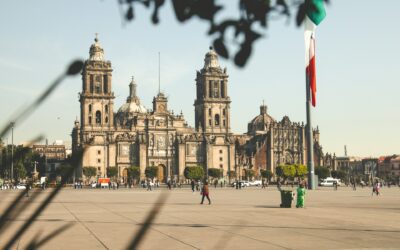|
|
As South Africa prepares to officially launch their digital nomad visa, debate rages in the beautiful city of Cape Town about whether the digital nomads who have already descended on the city are a boon or a burden.
Cape Town is not the only city to start to complain about the impact that digital nomads might be having on housing prices and gentrification, not to mention just a general disruption of the local culture. Lisbon in Portugal and Mexico City have both started to question their capacity to accommodate the large number of digital nomads that want to call their cities home.
But what exactly are locals saying that the problems are with digital nomads, and are their opinions founded? Are there solutions to solve these issues?
Problem #1 – Housing Prices
Probably the biggest concern that locals share about digital nomads is their impact on housing prices. They suggest that digital nomads come in and snatch up the best accommodation in historic districts. They pay more or pay months in advance, allowing them to out-compete locals.
While locals can sometimes benefit by renting their homes out on Airbnb but is usually wealthy locals with nice homes and a second place to live who benefit. However, some locals have said that they slept in their cars for months to rent out their homes. Moreover, it is often foreigners and corporations who snatch desirable housing to generate income from the short-term rental market.
South Africa
In Cape Town, one social media influencer said that the influx of digital nomads and subsequent rising house prices have ruined her dreams of getting her own place and moving out of her family home. But are digital nomads really driving up prices?
The South African property site PayPop says that the average rent in Cape Town is just US$540 per week, which is just 4% higher than it was a year ago. For comparison, house prices increased by just 2% in the United States in the same period, but 8% in Australia. Neither country has large international digital nomad communities due to their strict visa rules and high cost of living.
Colombia
Meanwhile, in certain neighborhoods in Medellin, a digital nomad hotspot in Colombia, even local professionals have been priced out. A one-bedroom rental now goes for the “gringo” price of US$1,300 per month, when the median monthly income is just US$300 per month. It is hard to attribute this to anything other than gentrification.
Portugal
One Reddit user from Lisbon commented that while locals like him don’t have any issues with individual digital nomads, they are extremely worried about the insufficient supply of housing and gentrification pushing people out of areas that their families have called home for generations. But he admits that this is as much down to labor conditions and the regulatory environment in the construction industry as foreign residents.
Mexico
The situation is similar in Mexico City, where graffiti can be seen in the streets saying “Gringo Go Home”. They blame foreigners for housing prices increasing by 247% in the last 15 years. But economists attribute this to construction industry rules that result in only a fraction of the new homes required being built each year.
Are Digital Nomads Responsible?
What all this means is that digital nomads and other foreigners aren’t responsible for the overall increase in housing prices, which is linked to a range of economic factors. But in some hot beds, which are suburbs rather than entire cities, foreigners are pricing locals out.
While locals could move to cheaper areas, as they have always done because of gentrification, it is hard for them not to see themselves as being “pushed out”, and to resent that it is wealthy foreigners who are inadvertently doing the pushing. That these genuine examples lead the residents of cities to believe that foreign residents are a major part of the problem is no surprise.
Problem #2 – Inequality
The next big problem that locals point to is inequality. Businesses emerge that serve foreigners, but which locals can’t afford to access. And even if they can afford to access those services, they can feel like they are treated differently.
For example, one Reddit user explained how businesses treat foreigners much better than locals. They say that this is often down to foreigners choosing to tip well, presumably with the intention of increasing their spending and support for the local community. But while this may have been done as an act of generosity (rather than “showing off”), it influences the attitudes of local businesses.
Indonesia
Another Reddit user, based in Canggu, Bali, complained about how the influx of digital nomads and tourists turned their sleepy village into another Western hippie village within just a few decades. Locals who are working hard to make a living watch digital nomads sleep late, surf all day, and then frequent establishments that locals can’t afford.
Costa Rica
In contrast, another user shared their experience as a restaurant owner in Costa Rica. Thanks to more foreigners in the area, they were able to grow their business and expand to a second location in the space of less than a year. She was also able to open a hostel, which enabled her to build housing for her local workers. When she visited Europe, she was surprised to see how badly the economy was doing when compared to her little town.
South Africa
In Cape Town, Alderman James Vos, who is on the city’s committee for economic growth, says that each digital nomad who passes through the city brings about US$2,700 of much-needed investment per month. He explains how this is boosting the local economy and helping local businesses.
Are Digital Nomads Responsible?
It is clear that catering to digital nomads and tourists represents a major economic opportunity for locals. It has been this way for millennia. Cities such as Greece and Rome have been making money off the millions of tourists that flock to their ancient sites for years, charging higher prices, with locals getting better food and service in other areas of the city.
While the permanence of digital nomads may add a new dynamic to the situation, this is not clear-cut. Many cities have tourists year-round, so while the faces may change, the demand and dynamic don’t. But over-tourism has also been a long-standing problem. One example is Amsterdam trying to limit tourists, especially the kind that come mostly for sex, drugs, and parties. Over-tourism is not a new issue for many cities, and newly emerging hotspots can learn from their experience.
Perhaps a bigger problem that locals do not seem to be talking about is that many foreigners don’t make tax contributions. This often isn’t an issue with tourists, who stay for a few weeks and tend to pay for premium services. But digital nomads are now staying for months or years, with special visas that let them continue to pay income tax in their home country rather than in the community where they are using public services. This seems like a major issue to be resolved.
Problem #3 – Cultural Confusion
Locals worry about foreigners who live in the area without learning the local language or respecting the local culture. This feels disruptive and disrespectful and just adds to resentment.
While most digital nomads tend to be open-minded people keen to integrate with the local community, that is not true of everyone, and they are often bunched together with tourists or young backpackers seeking parties and adventure. They are assumed to have similar behavior, even when they are making a genuine effort to “live like a local” and respect the local community.
South Africa
Our South African commentator noted that she often walks into cafes and hears more German, French, Dutch, and American accents than local voices. She also points out that digital nomad visas open the door to wealthy Europeans and Americans while excluding many Africans, who are still discriminated against in the visa system. It suggests that a higher value is placed on Western visitors. This seems like a valid criticism.
Colombia
In Colombia, the community is talking about “genital nomads”, who immediately join Tinder when they arrive in a new city and treat the locals like a bit of a meat market. Not only is this seen as degrading for locals, but it can also be dangerous for visitors. As was the case of an American man who was killed after going on a Tinder date with a local woman on Medellin.
Are Digital Nomads Responsible?
While we’d like to say that most digital nomads are respectful travelers, there is an inevitable cultural divide when wealthy foreigners travel to poorer countries specifically to find a better quality of life by making their money go further.
Are There Solutions?
It seems that there are no easy solutions to these “digital nomad problems”, since while digital nomads are a visible part of the issue, they are rarely the root cause.
Digital nomads would have less of an impact on housing prices if construction was easier and markets were better regulated.
Gentrification and cultural contamination would be less problematic if we were all better educated in general about what other countries are really like and respecting and understanding different cultures.
Revising the conditions of digital nomad visas could also be wise. Digital nomad visas are often restricted to people from wealthy Western countries, both directly based on their passports and indirectly with the minimum income requirements. The rules could be made fairer. Taxation rules could also be changed to ensure that digital nomads are contributing to the community in which they are living while maintaining their home tax status.
Just as a final thought and point of comparison, look at the Australian working holiday visa. It allows young people to travel around Australia for a year and work to support themselves while doing so with some restrictions. This helps with integration into the community, and they are paying local taxes on their income. In addition, if travelers want to stay for a second year, they must contribute at least 88 days to hard-to-fill rural jobs, such as fruit picking, which ensures that they are giving something of great value to the economy and community.
While these kinds of terms and conditions would not translate directly to a digital nomad visa, it is interesting to consider how the principles of integration and contribution (beyond just spending) could be integrated into the visa.












